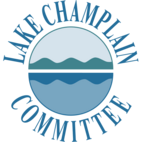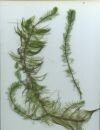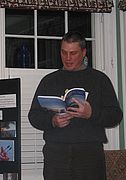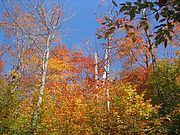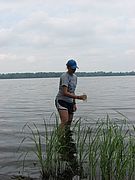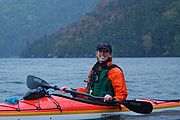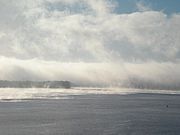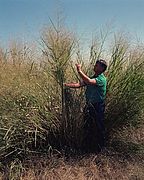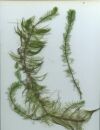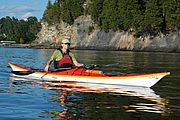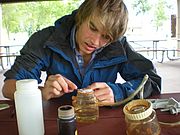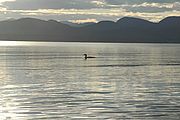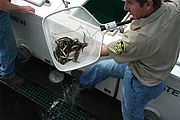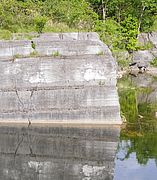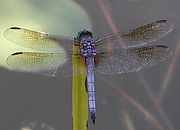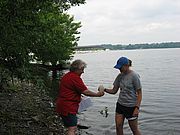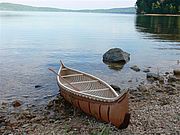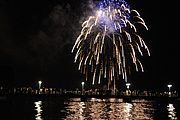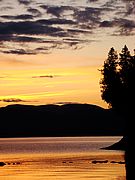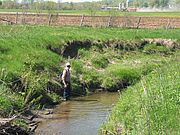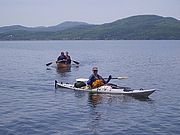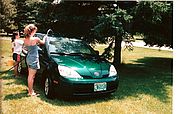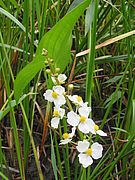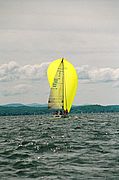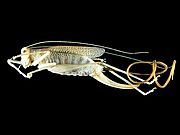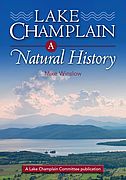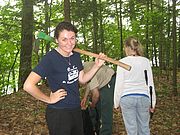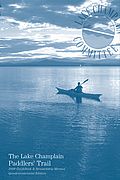Aquatic biologists at Vermont’s Agency of Natural Resources (ANR) found a population of the invasive plant, variable-leaved watermilfoil, in the southern end of Missisquoi Bay. Similar to the native whorled watermilfoil, a rare plant species in the state, the variable-leaved watermilfoil was confirmed by genetic analysis this week from samples pulled during a routine water chestnut search last month in the bay.
Though variable-leaved milfoil is known in the Adirondacks, Lake Champlain is only the second confirmation of the species in Vermont. The first was found in Halls Lake in Newbury in 2008. The invasive plant has also been found in Massachusetts, New Hampshire and Quebec waters.
Read...
Join LCC Staff Scientist Mike Winslow at the Lake Champlain Maritime Museum at Basin Harbor, Vermont on Thursday, October 1 for a provocative lake presentation. Learn about the forces that shape the lake, the creatures that call it home, the phenomena that add to its mystery, and what you can do to protect its future. The lecture is free and open to all so bring friends and family. Click here for directions to the Museum. Read...
While raking leaves and puttering around the house this fall, check the nearest stormdrain to be sure it too is free of debris. Plugged stormdrains prevent water from entering the storm sewer. Instead, the water starts eroding its own path to the nearest stream, and thus creates even more pollution.
One way to be sure the leaves you rake don’t contribute to clogging stormdrains is to compost them. Use your lawnmower to shred the leaves. If you have a bagger attachment the shredded leaves can be collected. Otherwise, use the blower on the motor to accumulate leaves. In either case the leaves make excellent mulch, or they can be added to a compost pile.
For more lake friendly tips, check out the Learn and Get Involved sections of our website and consider taking our Lake Protection Pledge. Read...
LCC wrapped up our 7th algae monitoring season just after Labor Day. Overall, although patchy blooms continued in Missisquoi Bay and sporadic blooms popped up in other parts of the lake, the frequency and intensity of blooms was lower this summer than in most past monitoring seasons. LCC staff identified a bloom in Kelly Bay at the far north end of the lake by the Rouses Point Bridge, an unusual place for such blooms. Though it is well known that high nutrient levels promote algae blooms, the exact triggers that determine when and where blooms occur are still unclear. The monitoring program is a key to efforts to identify toxic blooms, protect public health, and work for solutions.
Sincere thanks to the Lake Champlain Basin Program for funding support, our program partner Dr. Mary Watzin of the University of Vermont Rubenstein Ecosystem Science Laboratory and our faithful 2009 season monitors for their weekly wading into the water: Jennifer Bowman, Sally and Jim Brabham, Bryan Burke, Al Carpenter, Chris Case, Carson Cornbrooks, Deborah Diemand, Marc Eisenhower, David Greenough, Bill Magnus, Robert Martell, John McBride, Gary Molinski, Bob Murphy, Martha Perry, Larry and Jeanine Pratt, Mike Roach, Micah Rose, Julia Smith, Mark Sweeney, and Doug Ward.
Click here for an overview of the seasons monitoring results or go to www.lakechamplaincommittee.org/lcc-at-work/algae-in-lake/ and scroll to the bottom of the page. Read...
Foliage season, bird migrations and the serenity of a near empty lake all beckon the fall paddler. It can be a wonderful time to be on the water – if you’re well prepared. The cooler fall temperatures require a wet suit or dry suit. Any time the combined air and water temperatures are less than 120 degrees F, you should wear this extra gear under your Personal Flotation Device (PFD). You’ll also need lots of fuel to maintain your core temperature and reinvigorate tired muscles so be sure to bring lots of water and carbohydrate-rich snacks with you. Be cautious about heading out and make sure you, your boat and your group are properly equipped:
- Plan your trip ahead of time and make sure it matches the mental and physical skill set of your entire party.
- Leave your itinerary with a responsible onshore contact.
- Be aware of the wind, water and weather conditions before you depart.
- Bring a weather radio or VHF with you, check the weather forecast repeatedly, and adjust your travel plans accordingly.
- Always wear a Personal Flotation Device (PFD). Nine out of ten drownings occur in inland waters, most within a few feet of safety. Most of the victims owned PFDs but died without them. A properly fitted, buoyant PFD can save your life, only if you wear it.
- Wear a wetsuit or drysuit with an insulating layer and a hat that stays put. Dress for the season in layers of synthetic fabric to prevent getting overheated and chilled from perspiration or water.
- Pack extra dry clothing in a sealed bag.
- Test your gear in advance in a controlled cold water environment to learn how much protection it provides.
- Paddle near to shore and near others who can help you in the event of capsize.
- Make sure you have the skills to travel to and from shore and shelter.
- Ensure that everyone in your paddling party knows the signs and symptoms of hypothermia before you set out.
- Stay aware of all boat traffic.
- Fuel your body with high carbohydrate foods and lots of water.
We love to hear about our members’ outings! Please send pictures and tales from the water to: lcc@ lakechamplaincommittee.org. Read...
Throughout cold autumn evenings, the layer of air closest to the Lake Champlain’s water accumulates moisture and warmth. The moisture condenses and a thick steam fog forms with colder air masses generating thicker fogs. As the strengthening sun continues to warm the air, wisps of cloud flow upward, revealing the air’s convection currents. A layer of fluffy clouds hovers, seemingly suspended between the water and the otherwise azure blue sky. These clouds mark the border between the lake-warmed water and the cold air mass above. Eventually, the day’s sun warms all the air and the fog burns off. Click on the title to learn how steam fog played a key role in a pivotal Revolutionary War battle. Read...
The future will not look like the past. Such is true for the lake and the landscape. Rather than trying to recreate some hypothetical past utopia, we need to work towards a mutually desirable future state that is better than what we have. Agriculture may present the most significant opportunity today for envisioning and moving toward a desirable future state. Currently, agriculture in the Lake Champlain Basin is dominated by dairy production, but that may not be true in the future.
The dairy industry presents inevitable challenges to water quality. Cows produce manure which is high in phosphorus and bacteria. Cows, at least during the winter and on larger farms, eat corn, an annual crop that leaves much of the soil exposed and susceptible to erosion. Corn and other crops used to feed cows require inputs of additional phosphorus fertilizer which is a pollutant when it gets to the lake. Cows that are pastured instead of eating corn have a tendency to trample vegetation in their search for drinking water, directly contributing to erosion. All of these challenges can be managed and minimized, but they can not be eliminated.
Read...
Variable leaved-milfoil, a new invasive species in Lake Champlain, has been confirmed in Missisquoi Bay. Variable-leaved milfoil is closely related to Eurasian watermilfoil which already infests much of the lake. Click the headline for more information. Read...
LCC and the University of Vermont are collaborating on a recreational study for the Lake Champlain Paddlers Trail. Surveys were sent this summer to all LCC members who receive our annual Paddlers’ Trail guidebook. Thanks to everyone who has responded. If you haven’t returned your survey yet, please set aside some time this week to give us feedback on the Trail. By sharing your paddling experiences, what you value about getting out on the water, and your thoughts on what enhances or diminishes your recreational experience, you will help guide management of sustainable boating on Lake Champlain. We value your input and need your help! Read...
LCC volunteers have been hard at work collecting water samples to identify algae blooms around Lake Champlain. This summer has been relatively quiet. The thick pervasive bloom often seen in the lake’s northeastern bays has been less prevalent than in years past although a patchy bloom has developed in Missisquoi Bay, particularly in the eastern portion, and occasional short term blooms cropped up in other areas. Monitoring efforts continue through the Labor Day weekend. Click here for an overview of the seasons monitoring results or go to http://www.lakechamplaincommittee.org/lcc-at-work/algae-in-lake/ and scroll to the bottom of the page. Read...
If you see lights out on Lake Champlain in the next few weeks it’s probably not UFOs. The Adirondack Cooperative Loon Program will be conducting night time surveys of loons on Lake Champlain. Researchers have found that going out at night with spotlights allows them to sneak up on the birds and trap them with nets. They can then take blood samples to check for mercury and lead levels and evaluate immune response. They also tag the birds in order to track where they come from and where they are going. The project is a cooperative effort between the NY Department of Environmental Conservation, the Biodiversity Research Institute, and the Wildlife Conservation Society. Read...
The Vermont Fish & Wildlife Department gave its recently-established muskellunge restoration effort a boost in August when it stocked 250 four-month old muskellunge in the Missisquoi River Delta. The fish were donated by the New York State Department of Environmental Conservation.The muskellunge, related to northern pike, but larger, is a prized sport fish. Lake Champlain and the Missisquoi River are the only locations in New England that historically had a native muskellunge population. Muskellunge were native to Lake Champlain’s Missisquoi River and Missisquoi Bay but the population that last existed upstream of the Swanton Dam was apparently lost in the late 1970s following a chemical spill that occurred on the upper river. Read...
Imagine sitting in a lounge chair with your feet in the water looking out over a tropical sea. The sun blazes away and the reefs around you teem with life. There was a time, nearly half a billion years ago, when the area we now call Lake Champlain hosted such an environment. This was before life existed on land, before the bedrock of the region had even formed.
At the time, the continental plate upon which Lake Champlain sits today was located in the lower latitudes of the Southern Hemisphere. Carbon dioxide levels exceeded today’s levels by 14 to 16 percent, and the earth was so warm that practically no ice existed. As a result, sea levels were much higher and the continental shelf was covered by a shallow arm of the Iapetus Ocean. In this arm, some of the world’s earliest reefs developed. Read...
Their names can evoke spine-chilling fear - bog haunter, pond hawk, shadow dragon, widow skimmer - or elfin magic - jewel wing, aurora dancer, sedge sprite. They are the subject of old wives tales about sewn lips of misbehaved children or their ability to reincarnate snakes. Few animal groups inspire more colorful stories than dragonflies and damselflies. Yet, even if the wives tales are not true and the names are only fanciful, these insect masters of the sky still lead fascinating lives. Together, dragonflies and damselflies comprise the insect order Odonata or “toothed ones”. Generally, dragonflies are faster and larger than damselflies, but the most reliable visual difference between the two groups is how they hold their wings when resting. Dragonflies hold their wings horizontal to the ground while most damselflies hold theirs perpendicular. Both groups are predators as adults and nymphs. Read...
LCC kicks off its seventh year of algae monitoring around Lake Champlain on July 6th. Water samples are taken weekly by volunteers around Lake Champlain and the results are analyzed by UVM’s Rubenstein Ecosystem Science Laboratory. LCC coordinates volunteer efforts and transports samples to UVM for analysis. Monitoring continues through the Labor Day holiday.
If you see algae blooms outside Missisquoi Bay, St. Albans Bay or the Alburg Passage, first check out LCC’s pamphlet on floating phenomena (pdf) and then contact us at lcc@ lakechamplaincommittee.org for guidance on collecting a sample for identification. Read...
As part of the Quadricentennial celebrations, a fleet of birch bark canoes will paddle to the Burlington waterfront on July 14, 2009, the exact anniversary of Champlain’s arrival to the lake. Paddlers are invited to accompany the canoeists in a flotilla of human-powered watercraft. Participants will muster at noon at Shelburne Bay and launch at 1 pm. The birch bark canoes will land in Burlington at 5 pm for a special ceremony. Please contact veteran boat-builder Douglas Brooks at 802 877-3289 if you’d like to join the event. There’s a $10 fee to participate but it’s free to watch. Read...
An impressive array of cultural and historic events have been unfolding this year as the region commemorates the 400th anniversary of Samuel de Champlain’s voyage to the lake. You’ll find more information on some of the programs scheduled at www.celebratechamplain.org and www.discoverlakechamplain400.org. The Quadricentennial is an opportunity to learn some history, recreate, and explore. It’s also a time to think about the lake’s future and how we can ensure it’s a healthy one. With that in mind, please consider celebrating the lake by taking LCC’s Lake Protection Pledge and committing to steps that will reduce your personal impact on water quality. Together we can create a clean lake! Read...
Learn more about the lake at these upcoming events
Explore the forces that shape Lake Champlain, the creatures that call it home, and how you can make a difference in its future at Main Street Landing’s Film House, 60 Lake Street in Burlington on July 6th at 7 pm. Click on the title above to see what we have lined up for the next few weeks or check out the LEARN section of our website for upcoming programs. Contact us at lcc@lakechamplaincommittee.org if you’d like to schedule an LCC presentation in your community. Read...
LCC along with the Vermont Agency of Natural Resources (ANR) has recently completed our third year of monitoring at a stream restoration site on Rugg Brook in St. Albans. Rugg Brook is an impaired waterway that flows into St. Albans Bay. An LCC assessment of the stream in 2005 revealed a section with steep eroding stream banks. ANR then partnered with landowners Andy and Nicole LaPierre, the town of St. Albans and LCC to flatten the banks and allow flood waters to dissipate over the surrounding lands rather than continuing to erode them and carry sediment to St. Albans Bay. LCC has remained active in assessing the success of the project.
Over the last three years the stream has settled into a well-defined channel, vegetation has re-established at the site, and planted willows are thriving. This is in stark contrast to the first year following construction when there was extensive disruption. Vegetation had not yet established and the stream thrashed about in its floodplain, cutting off meanders and creating new channels. Sometimes conditions need to get worse before they can improve. Monitoring will continue for two more years. Read...
The 2009 Quadricentennial edition of the Lake Champlain Paddlers’ Trail and Stewardship Manual is out! This year’s edition includes new site descriptions, revised maps and a special section on cultural history. Join or renew your membership at a level of $40 or more and we’ll mail you the informative guide to the Trail’s 37 locations that provide access to more than 700 campsites. Read...
Washing the car on a sunny weekend afternoon is part of the typical suburban summer scene. But usually the dirt, grime, detergents, and greases from the car end up in the local waterway and eventually Lake Champlain. Here are some tips to make your car washing more lake friendly:
- Use a commercial car wash - water from commercial washes is treated before reaching streams and less water is used overall.
- Wash over permeable surfaces like grass or gravel rather than in the driveway.
- Reduce excess use of water by using a trigger hose and bucket.
- Dispose of leftover water in the toilet.
For more lake friendly tips, check out the Learn and Get Involved sections of our website and consider taking our Lake Protection Pledge. Read...
On land plants have developed elaborate mechanisms to ensure pollen passes from male flowers to female flowers through wind or intermediate pollinators and thus ensuring reproduction; water presents a different challenge. Pollen can not move through water as it can through air and the reliable insect pollinators are much less abundant. Most aquatic plants compensate by holding their flowers above the surface of the water. Once pollination has been completed the stem holding the flower might coil as in water lilies, pulling the flower down below the water surface and out of sight from seed and fruit predators.
A few plants actually pass pollen through the water. One such species is coontail, a common native underwater plant sometimes mistaken for Eurasian water milfoil. In this species, male flowers break off of the plant and float to the surface. Once there they drop pollen which sinks down onto the female flowers which remain below water. Despite the fascinating strategies that some species have developed, vegetative growth from existing plant material is still the most common form of reproduction. Read...
Get out on the water and support great lake-related causes - including the Lake Champlain Committee - by participating in the 2009 Regatta for Lake Champlain! The event kicks off Friday, July 24th from 7:30 pm to midnight at the ECHO Science Center in Burlington, VT with a Lake Lovers' Dance Party. In addition to great entertainment, food and drink, there will be many door prizes and a silent auction featuring a 4 day/3 night vacation at Andros Beach Club in the Bahamas and lots more. Tickets for the lake benefit are $15/person, or $25/pair (21 years and up) and can be purchased at the door or in advance from http://www.regattaforlakechamplain.org.
The Regatta Sailing Race will be held on Saturday, July 25th, at 11:30 am just outside Burlington Harbor. Awards for this family-friendly pursuit-style race are given for placement in various classes, the Largest All-Family Crew, Last Boat, Youngest Crew, All Female Crew, Oldest Boat, and Middle of the Fleet. The boat that raises the most sponsorship money wins a special prize for the entire crew. The "pursuit" race has a staggered start to eliminate the stress and jockeying of a traditional race. Participating boats are given a handicap based on the length of the course and the speed potential of the boat. Smaller boats start first. The appeal of the race is that it brings all the classes of boats to the finish line around the same time making for a fun and exciting conclusion! The Regatta is open to racer, cruiser, or daysailor sailboats. For pre-race party and race entry details, prize and award information, or to sign up a crew or sponsor a boat, go to www.RegattaForLakeChamplain.org.
Since 2004 the Regatta has raised over $40,000 for lake causes. Over $10,000 has been donated to the Lake Champlain Committee to support our water quality protection and lake access work. Read...
“For most creatures being parasitized is a way of life” writes Annie Dillard in A Pilgrim at Tinker Creek. She later notes that an estimated ten percent of the world’s animal species are parasites. Lake Champlain is not immune.
Parasites, by definition, have an extended relationship with their host during which time they feed from the host, but in most cases they do not kill the host. Under this definition, mosquitoes or black flies do not count as parasites because they have a fleeting relationship with their food source. Of course, the exact line between an “extended relationship” and a “fleeting relationship” is fuzzy.
Most studies of parasites in freshwater systems focus on those that affect fish. Wildlife ecologist David Marcogliese estimates there are over 700 known parasites of Canadian fish, not including bacteria and viruses. The numbers for Lake Champlain are probably not much lower. These range from the very large and well-known sea lamprey to more cryptic mussels, worms, and fungi. Click on the title to read the complete article.
Read...
Lake Champlain: A Natural History has won an IPPY Award from Independent Publishers. The group recognizes the best independently published books of the year. Our book tied for silver for Best Regional Non-Fiction in the US Northeast.
If you haven’t gotten your copy yet or sent one on to a fellow lake lover, you can make a purchase today at our secure website www.lakechamplaincommittee.org or by calling us at 802 658-1414. Read...
New York State Electric and Gas (NYSEG) has completed removal of contaminated wastes for an upland area of a former manufactured gas plant on Saranac Street in the City of Plattsburgh. The plant operated from 1896 to 1960, and the contaminants were by-products of gas production. Over 150,000 tons of tar-contaminated soils and over 7-million gallons of contaminated liquids were collected and treated. At this time, proposals are being considered for Phase II of the project which will address contaminated river sediments. Read...
Join in a fun day of trail maintenance and hiking at beautiful Niquette Bay, one of the stops on the Paddlers’ Trail. Individuals and families with children 8 and up are welcome to help us get this popular network of trails ready for summer. Lunch will be provided. Come prepared with sturdy boots, gloves, water, sunscreen and bug repellant. Please register in advance with Jessica Ricketson at 802 879-5680 or jessica.ricketson@ state.vt.us so we’ll be sure to have enough food!
This maintenance project is a collaborative effort of the Vermont Department of Forests, Parks and Recreation, the Girl Scouts, American Hiking Society, No Child Left Inside, and the Lake Champlain Committee. Read...
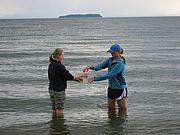
For the seventh consecutive year, the Lake Champlain Committee is coordinating a volunteer blue green algae monitoring program for near-shore areas of the lake. Citizen monitors collect water samples on a weekly basis which are analyzed by the University of Vermont. The program is critical to expanding knowledge of how, why, and when blooms form and what triggers them to turn toxic. It also provides data to public health agencies for posting about swimming safety. We need monitors to sample at Beggs Park in Essex, NY and High Rocks in Highgate Springs, VT. LCC will provide sampling equipment, training, and ongoing support. Willing volunteers need to be able to take water samples between 10AM and 2PM on Sundays or Mondays between July 6th and September 8th. LCC will arrange a Monday morning pick-up with the Essex volunteer. The High Rocks volunteer must deliver the samples to the Missisquoi National Wildlife Refuge Headquarters by Tuesday morning. Samples are taken in very shallow water, so a boat is not necessary so long as the volunteer has access to the shore. A short training session will be held on Monday June 29th. If you or anyone you know is interested please contact LCC staff scientist Mike Winslow at 802-658-1461 or mikew@ lakechamplaincommittee.org. Read...
The 2009 Quadricentennial edition of the Lake Champlain Paddlers’ Trail and Stewardship Manual will be mailed in June. Join or renew your membership at a level of $40 or more and we’ll mail you the informative guide to the Trail’s 37 locations that provide access to more than 700 campsites. Read...
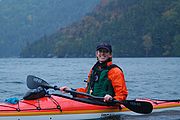
Even if air temperatures seem balmy, the lake takes much longer to warm up. Additionally, strong currents and the presence of springtime debris add to risks this time of year. Current Lake Champlain temperatures are in the 40s. If you are immersed in water that cold for a half hour, exhaustion and unconsciousness can set in. Water temperatures of less than 70 degrees Fahrenheit can cause you to lose precious body heat up to 25 times faster than comparable air temperatures. Water temperatures in many areas of Lake Champlain, particularly the Main Lake, never reach the 70s. Be cautious about heading out on the water and make sure you and your boat are properly equipped. Bring a weather radio or VHF with you and check the weather forecast repeatedly. Always wear a Personal Flotation Device (PFD). Nine out of ten drownings occur in inland waters, most within a few feet of safety. Most of the victims owned PFDs but died without them. A properly fitted, buoyant PFD can save your life, only if you wear it. Dress for the season. If kayaking or canoeing in cold water conditions (no matter what the air temperature is) wear a wetsuit or drysuit with an insulating layer. Here's to safe, fun adventures on the water. Read...
